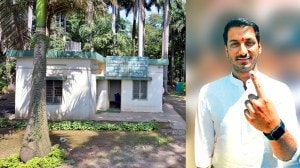Poll reforms, Judges Bill with House panel for consensus
After sitting on the 21-point reform agenda proposed by the Election Commission, the Law Ministry on December 11 referred the proposal to the Parliament Standing Committee on law-justice/public-personnel grievances to evolve a political consensus.

After sitting on the 21-point reform agenda proposed by the Election Commission, the Law Ministry on December 11 referred the proposal to the Parliament Standing Committee on law-justice/public-personnel grievances to evolve a political consensus.
The government’s move to evolve a consensus on the issue of criminalisation of politics has gained significance with reports suggesting that jailed gangster Abu Salem was planning an electoral foray during the ensuing Uttar Pradesh Assembly elections.
The Committee will also table a crucial report on the Judges (Inquiry) Bill that seeks to create a judicial forum to deal with complaints against erring members of judiciary. Chaired by EM Sudarsana Natchiappan, the Parliament Standing Committee is expected to submit both reports to Parliament during the Budget session.
While the committee has already sought comments from all national and recognised regional parties on the electoral reforms, it is seeking the opinion of constitutional and legal experts regarding the Judges (Inquiry) Bill. “We are holding three meetings a week now. From February 1, we will be sitting continuously to wrap up the report,” Natchiappan said.
However, the committee is still divided on the issue of electoral reforms. BJP Rajya Sabha member PC Alexander said he felt it was the fundamental right of the voter to get clean candidates. But others believe provisions that prohibit a chargesheeted person from contesting elections could be “politically misused like POTA”. “Besides, how can we overturn the Indian legal system which puts the onus of proof on the prosecution and treats the defendant as innocent unless proved guilty,” a Congress member said. The members also expressed concern over the increasing power of the Election Commission.
On the Judges (Inquiry) Bill, Natchiappan said the Constitution provides for proceedings against a judge through a motion initiated by either 100 members of the Lok Sabha or 50 from the Rajya Sabha with permission of the presiding officers. “In view of the sensitivity of the matter, we thought it best to invite opinion from all quarters—public, legal and constitutional experts, intellectuals and academicians—to make it as flawless as possible,” he added.
The Bill proposes the formation of a National Judicial Council to look into allegations of misbehaviour or incapacity of Supreme Court and High Court judges.
“The views submitted to the committee, in written or oral form, would form part of the records of the committee and would be treated as confidential,” Natchiappan said. The committee, he said, has requested retired Chief Justices of India to shortlist some 30 retired judges to form a think-tank on the issue.



- 01
- 02
- 03
- 04
- 05




























